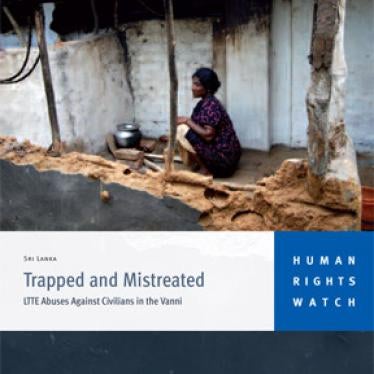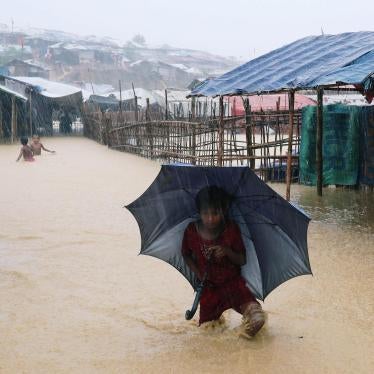When the fifty-ninth division of Sri Lanka's army entered Mullaitivu on 25 January 2009, it marked the fall of the last major town under the control of the separatist Liberation Tigers of Tamil Eelam (LTTE). The end may be in sight for the conventional armed conflict between government and LTTE forces which since 1983 has taken the lives of some 70,000 people, primarily in the island's north and east.
The capture of the town followed an advance by government troops during which they had gradually squeezed the LTTE forces into Mullaitivu district in their northern Vanni stronghold. The seizure of Mullaitivu itself means that the remaining Tamil Tiger forces have headed for long-prepared fortified areas deep in the area's thick jungles - taking many civilians with them. The army leader, Lieutenant-General Sarath Fonseka, announced Mullaitivu's capture by saying that the war was "95% over" and that it "was a matter of time" before his troops had gained complete control over the entire area previously held by the LTTE.
The LTTE, long notorious for suicide-bombings and political assassinations, has been among the most abusive rebel movements in the world. Even as it has claimed to be fighting for Sri Lanka's Tamil minority, the Tigers' leadership has never hesitated to eliminate any Tamils who proposed defending Tamil rights through other means. Within the areas it controlled, it ruled through heavy-handed repression. Its attacks on civilians led to the proscription of the LTTE in many countries, including India, the United States and the European Union zone.
But even as the Sri Lankan government makes triumphant claims of victory, it is timely to recall that success on the battlefield is no guarantee of ending the causes of war. The political grievances that fuelled the creation of the LTTE and other militant Tamil groups are no nearer to resolution than when the conflict started a quarter-century ago.
The Tamils' trauma
The situation of Sri Lanka's Tamils has become worse under the present government of President Mahinda Rajapakse, elected in November 2005. A scourge of enforced disappearances, in which hundreds of Tamils have been abducted rarely to return, can be traced to the state-security forces and paramilitary groups operating on their behalf. There have also been massacres of Tamil aid workers, students and other non-combatants, some of which have led to well-hyped but feckless government inquiries - and absolutely no prosecutions.
Since major fighting resumed between the government and the LTTE in mid-2006, neither side has shown much regard for the security of the largely Tamil civilian population in the north and east. In the most recent round of fighting that began in September 2008, the Sri Lankan government has refused to allow either humanitarian agencies or the media to operate in the conflict area. The United Nations was forced to withdraw. During the fight for Mullaitivu, there have been credible allegations of large numbers of civilian deaths; but without independent monitors on the ground, the true scale of the tragedy is unknown.
Those civilians who escape the LTTE's grip and flee from the fighting in the Vanni are kept under detention by the Sri Lankan government in heavily militarised camps. The Rajapakse government has ignored both human-rights groups and United Nations humanitarian agencies who have called for a transparent registration of persons displaced in the conflict and then allowing them freedom of movement, including permission to stay with relatives and host families.
The defeat of LTTE forces elsewhere in Sri Lanka has sadly replaced one form of oppression with another. In the east, where a breakaway faction of the LTTE is now responsible for civilian administration with the support of the Rajapakse government, human-rights violations continue on a daily basis. Government officials say they need time to return the area to normalcy, but have installed former LTTE fighters in powerful positions and have taken virtually no action to address killings, abductions and extortion that plague the local population. Instead of benefiting from a peace dividend, many residents of the east continue to suffer violence.
In Colombo, Tamil civilians are being ethnically profiled in an attempt to identify suspects. The message of the Rajapaskse government seems clear: all Tamils are suspected LTTE supporters unless proved otherwise. Tamils live in fear of being expelled from the city as Sinhalese ultra-nationalists attempt to settle long-standing scores with a community it falsely believes unanimously supports the LTTE.
The capital's targets
The army's success has not meant an easing of the government's repression of freedom of expression and the press. Instead, the Rajapakse government chooses to silence critics with intimidation and arbitrary arrests. The media is a particular target. A columnist with the Sunday Times newspaper in Colombo, JS Tissainayagam, and the paper's publisher V Jasiharan and his wife V Valamathy, have been in detention since March 2008 on transparently political charges. Upali Tennakoon, editor of the Rivira newspaper and chairman of the editors' guild of Sri Lanka, was attacked, along with his wife, on 23 January 2009. The Tamil human-rights activist and parliamentarian, Mano Ganesan, was interrogated about his meetings with the LTTE, even though these were held during a ceasefire when the government was engaged in peace talks with the rebels.
On 8 January 2009, the editor of the Sunday Times, Lasantha Wickrematunge was assassinated by unknown gunmen on motorcycles while riding in the back seat of his car in a heavily protected area of the capital city. Lasantha's death made international headlines because he had written an editorial to be published in the event of his death - and blamed his murder on the Rajapakse government (see "And Then They Came For Me", 11 January 2009, Sunday Leader, 11 January 2009).
Since Lasantha's murder, many journalists and civil-society activists have fled into exile. Those who remain worry each day about being abducted in trademark white vans, about being summoned for interrogation by the security forces, or being killed by gunmen who operate with impunity even in high-security areas of Colombo. The government's own records indicate that in 2007-8, nine journalists have been killed and twenty-seven assaulted.
The government's test
Any proclaimed victory is hollow if what remains is a terrified minority population that anticipates discrimination and fears retribution. If the Rajapakse government is serious about resolving long-standing Tamil grievances, it must deliver justice and fair treatment to this and other minority communities. It must ensure that human rights are protected and that all those responsible for abuses, even government officials regardless of rank, are held to account. The failure to do so will means continued human-rights abuses in a nation where genuine respect for rights has proven elusive.
Indeed, the government will be helping itself as well as all Sri Lanka's people if it learns to listen to and protect those who have long suffered at the hands of the LTTE. It must show that it will take on those who murder and threaten Sri Lankans of all ethnicities just as seriously as it has taken on the LTTE. The government must accept that peaceful critics are not enemies, they are an uncomfortable conscience. Unless those voices are heeded, there is little chance of winning the war for lasting peace.
Meenakshi Ganguly is senior South Asia researcher for Human Rights Watch.








